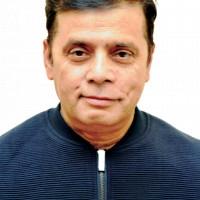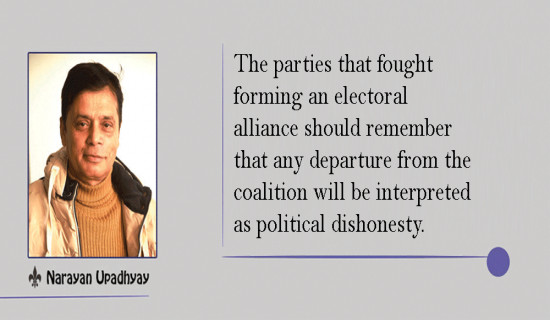- Thursday, 26 February 2026
59thAnniversary Special Supplement
Responsible Journalism: A Work In Progress
Journalism, widely hailed as the fourth pillar of democracy, has enormous power in influencing society by cultivating public opinion on all significant topics of the past, present, and future. The Nepali media is no different when it comes to wielding its opinion-making impact on the public. The country witnessed this when Nepal's tryst with responsible journalism began on May 6, 1901, with the release of Gorkhapatra that marked the official start of the country's journalistic journey.
The oldest daily, Gorkhapatra, established the basis for responsible journalism in Nepal, using a state-run medium to inform, educate, and inspire the public, resulting in constructive societal transformation. Despite being established by the autocratic Rana rulers, the first newspaper served as a pillar of news and information dissemination at a time when Nepali society was not open. Its companion journal, The Rising Nepal, which debuted much later in January 1965, enhanced this function by providing news, views, and analysis of events in English to a growing readership of English newspapers. Since then, Nepali journalism has seen significant changes, traversing numerous political changes and technological revolutions.
Challenges
Despite having a rich history, journalism in Nepal, and around the world, is facing challenges, owing mostly to the spread of internet media and social platforms, which have altered the media scene along with the fundamental values of journalism.
The arrival of democracy in 1950, as well as Nepal's first democratic elections in 1958, brought about significant changes in our society, thanks to, in part, the then media, published within and outside Nepal. However, this success was short-lived; in 1960, King Mahendra dissolved the elected parliament, banned political parties, and jailed significant leaders, including B.P. Koirala, the first democratically elected prime minister, and started autocratic rule under the Panchayat system.
Between 1960 and 1990, Nepal's democracy suffered during the Panchayat regime. The negligible media outlets then suffered harsh restrictions but continued to engage in "mission journalism" to resist the dictatorial government. These initiatives fuelled the pro-democracy movement, which culminated in the return of democracy in 1990. Private media firms, notably significant broadsheets, rose to prominence after 1990. Journalistic freedom grew under the new system. Private media continued berating leaders and ministers post-1990s, thus making the public aware of wrongdoings of the then leaders. Several leaders and ministers suffered jail terms as media exposed their corruption to the public. The press went on criticising former King Gyanendra Shah throughout his autocratic, divisive reign in the early 2000s. Journalists' fortitude during these trying circumstances exemplifies the transformative power of ethical journalism.
Transformation
Nepal's media landscape has now transformed considerably, with conventional print media coexisting with digital platforms, social media, and sites like YouTube and TikTok that have the capacity to spread information of kinds quite quickly. While these platforms have democratised their content creation and increased access to information, they have also posed substantial obstacles. Traditional media such as print, television, and radio are struggling to retain their audiences as more people turn to digital material these days.
Unfortunately, many online publications prioritise sensationalism above substantive reporting, frequently disseminating false material in order to generate hits and views. The rise of uncontrolled online platforms has made the spread of false information shockingly simple. Viral disinformation, as seen during election seasons and other significant events, frequently misleads the public and influences voter opinions.
In response, the government has used anti-cybercrime legislation to take action against anyone who circulates false information against political leaders and public people. Cybercrime, which frequently involves multiple forms of new media, has also increased. These crimes include disinformation campaigns and cyberbullying, as well as hacking, plagiarism, pornography, phishing, and online harassment. To address these developing concerns, Nepal's first anti-cybercrime law, the Electronic Transactions Act (ETA) of 2006, went into effect in September 2008. More recently, the National Cyber Security Policy 2023 enhanced legislative frameworks for combating cybercrime and ensuring cyberspace security.
The commercialisation of media is a major issue, with publications frequently prioritising money over fact-based investigative journalism. Sensational headlines, biased reporting, and conflicts of interest jeopardise journalistic integrity, lowering the profession's reputation in society. However, responsible journalism has significant advantages.
Ethical journalism is a trustworthy source of information, allowing citizens to make informed choices about their lives and communities. During Nepal's democratic fight, the media played an important role in teaching the populace about their rights and the necessity for structural transformation. Journalists serve as watchdogs, bringing power to account. The Nepali media played an important role in exposing abuses of authority under King Gyanendra's rule, thereby gathering public support for democratic restoration.
The same demonstration assisted political parties in bringing in a new style of administration for the country—federal democratic republicanism—by abolishing monarchy and federating it. Our media contributed to the development of understanding and unity, as well as the inclusion of marginalised people and regions in the government process. Indeed, in Nepal's diverse community, journalists may emphasise stories and events that encourage inclusion and cultural harmony.
Core values
To reclaim public trust, media in Nepal and around the world must embrace its core values of accountability, ethics, and truth. Media organisations should develop and follow strict ethical norms. Journalists must be encouraged to participate in responsible journalism, and organisations must engage in capacity-building endeavours and equip journalists with the appropriate training.
Meanwhile, raising public awareness and educating people on essential news analysis can help to mitigate the impact of misinformation and disinformation. Citizens with media literacy are better able to distinguish between trustworthy and incorrect information. Furthermore, media outlets should devote resources to investigative reporting, which exposes social inequalities, corruption, crimes, and abuses.
Strong but open regulatory systems can maintain accountability while not restricting press freedom. Such tools are critical to combatting disinformation while upholding democratic norms.
To summarise, responsible journalism is more than just a professional responsibility; it is a societal duty. As Nepal navigates political, social, and economic upheavals, the media's position becomes increasingly important. Journalists must go above narrow interests to prioritise the country and its people, encouraging change while reporting on it.
From Gorkhapatra's pioneering days to the present digital age, the press has played an important role in Nepal's socioeconomic transition. However, contemporary circumstances necessitate a renewed commitment to journalistic ideals. Ethical journalism, founded on truth and accountability, remains the most effective means of informing, inspiring, and unifying society. While perfection may remain unachievable, the goal of responsible journalism is a continuous endeavour worth pursuing.
(Upadhyay is a former managing editor of this daily.)
















